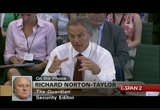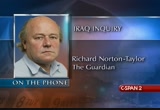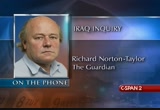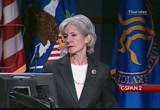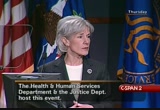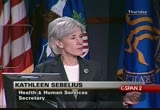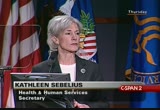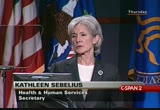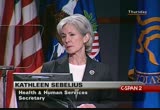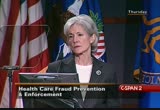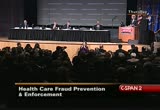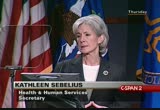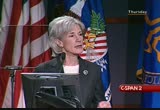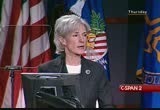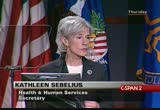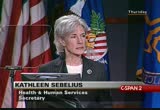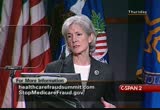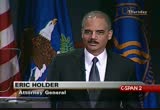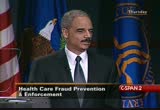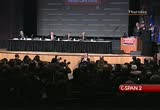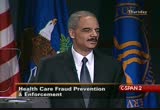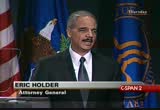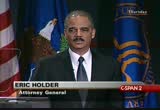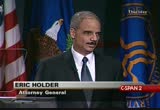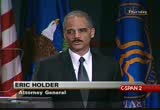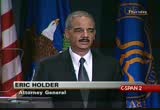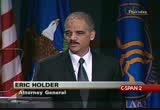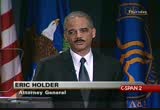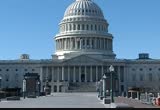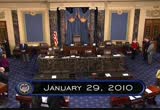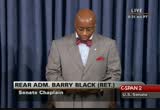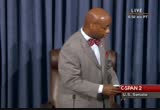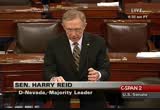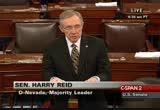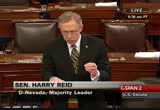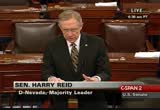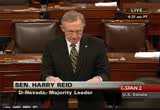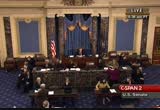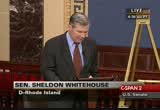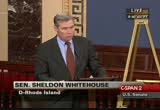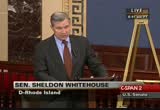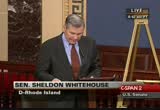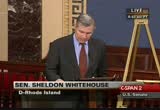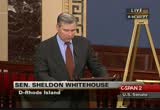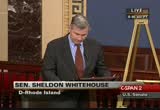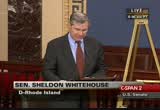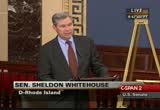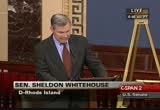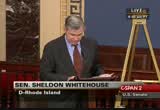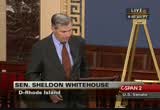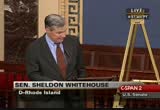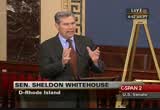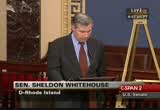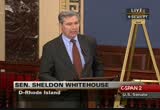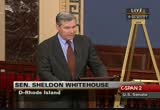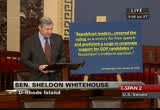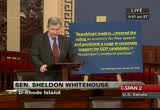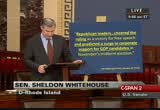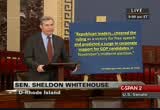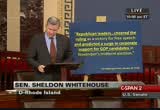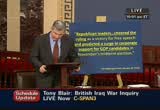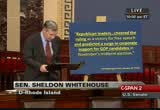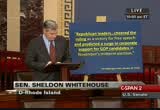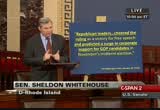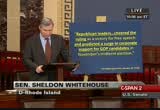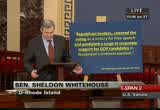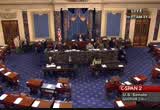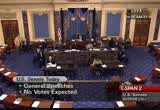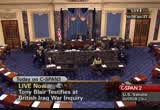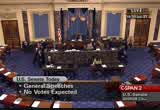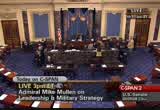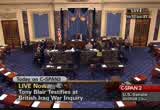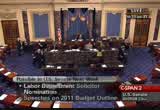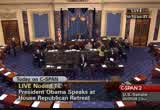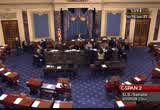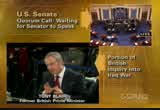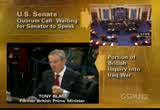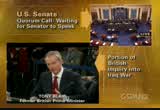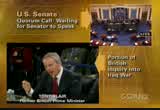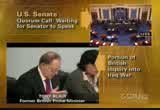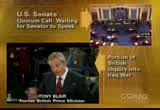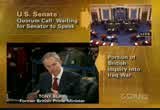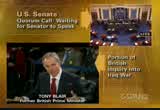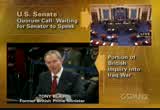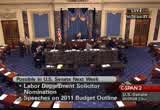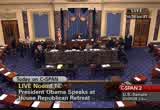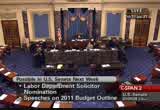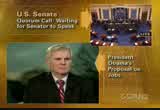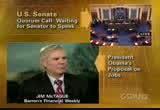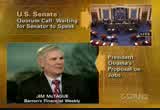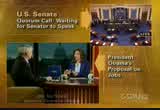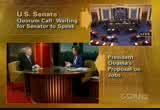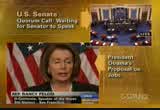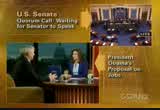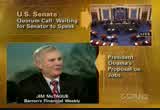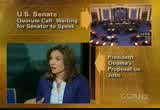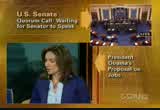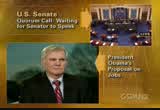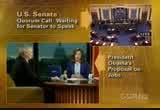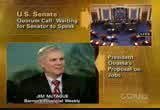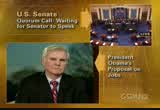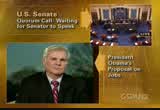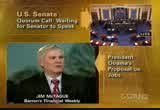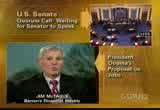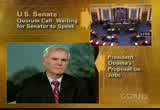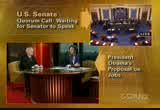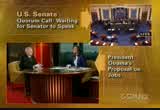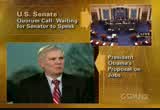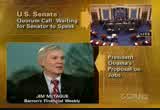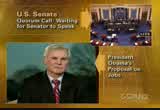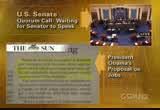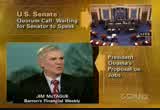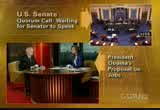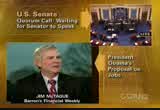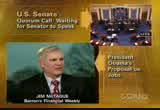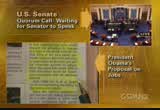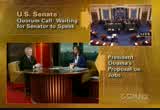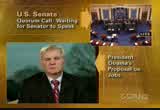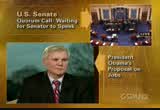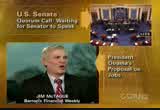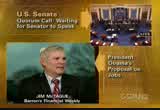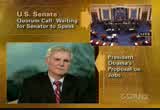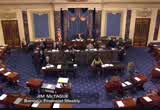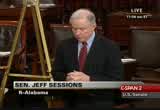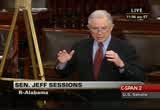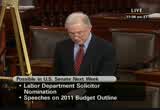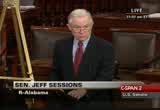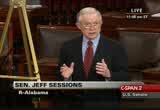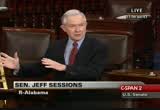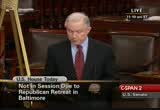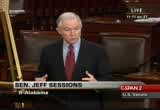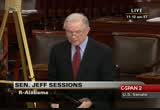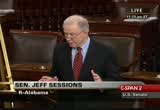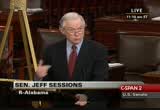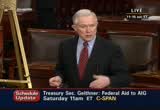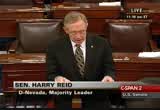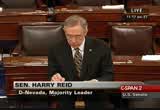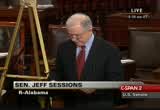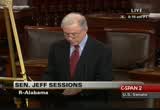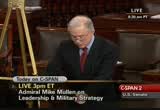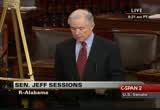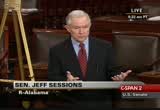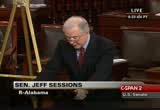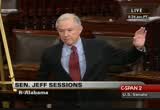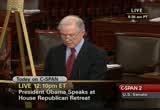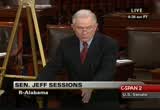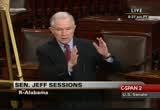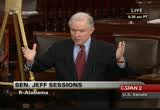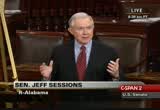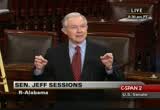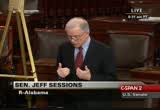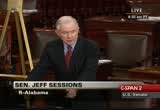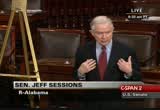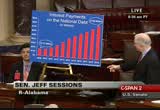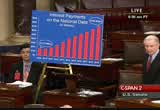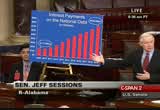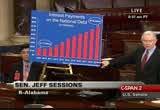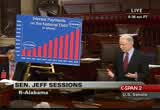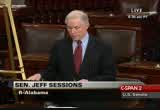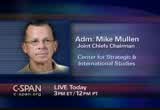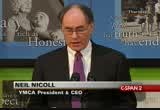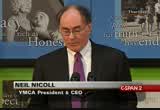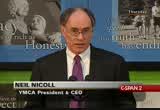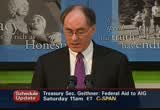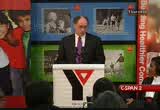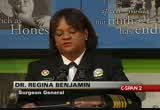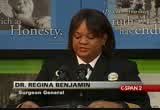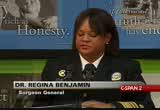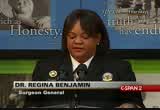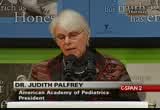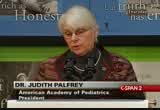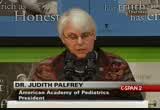tv U.S. Senate CSPAN January 29, 2010 9:00am-12:00pm EST
9:00 am
international law -- an invasion of iraq would have been unlawful without another u.n. security council resolution. >> and you wrote in the guardian that a couple of tony blair's aides right up to the start of the iraq war opposed it. have they testified so far? >> some of the -- two lawyers -- two senior lawyers in the foreign office opposed it and they have testified a couple days ago. and that was not known. one person resigned -- a woman and that was, of course, was known because she resigned before the war. what was not known was the senior law officers in the foreign office and the attorney general had serious doubts about the law. he then came around -- people say he was bullied by political reasons by tony blair. so tony blair has to ask the questions did he think at all about the legality question?
9:01 am
the evidence was he wasn't open about it. and the failure to plan. and indeed of the aftermath of the invasion, the occupation of iraq. and i suppose i should say also the evidence so far is that despite blair supporting bush so strongly, the evidence is britain had very little influence -- no influence on the military tactics but also the tactics on how to cope with an occupied iraq. >> current prime minister gordon brown served with tony blair during the iraq war years. what was his role and will he testify before the inquiry? >> well, that's a good question because at the beginning they said we don't want to get involved in party politics but that was a forlorn hope because it got a lot of coverage in parliament and a lot of issues emerged from this inquiry and gordon brown has agreed to give testimony before the general election. the idea he and the other ministers would not do so until
9:02 am
after the general election which will be held in early may and early june. and gordon brown will give evidence by the end of february or early march. he has not said anything about the -- what he thought about the iraq invasion and the war. he was the chief treasury minister and the evidence was that he stopped the british arm forces from getting money they needed specifically to buy helicopters. >> richard norton-tator from the guardian, thank you for joining us. thank you.
9:03 am
9:04 am
with kathleen sebelius. their comments are about a half hour. [applause] >> well, good morning. nice to have you all here today. and thank you to the great deputy secretary. and i want to join him in welcoming all of you today and also to thank the attorney general not only for being here but for his tireless commitment and for being a great partner in fighting fraud. i want to also recognize incoming acting deputy general grinler, who i just had a chance to say hello to. and thank you for being here and for your partnership in this effort. we're here because this administration has zero tolerance for criminals who steal from taxpayers, endanger
9:05 am
patients and jeopardize medicare's future. when families are scraping to pay their medical bills, fraud, waste and abuse in our healthcare system are simply unacceptable. so today the president has asked us to put criminals on notice. the attorney general and i have convened this unprecedented summit featuring leaders from the public and private healthcare sectors because we believe the problem with healthcare fraud is even bigger than government, law enforcement or the private industry can handle alone. we'll need all of us working together to solve it. in the fight to prevent, find, catch and prosecute the crooks, we want every good idea we can get. everyone here has something to offer because healthcare fraud is a national problem. it affects federal programs like medicare, state programs like
9:06 am
medicaid and private insurance companies. we're all vulnerable because we're all part of a healthcare system that's undergoing rapid growth. between 1970 and today, america's annual healthcare spending has gone from $75 million to over $2.5 billion. that's produced significant benefits for patients but it's also created a much bigger target for criminals. and a much bigger challenge for investigators. the difference has somebody said between catching fraud then and now is trying to find a penny in a bathtub and now we're dealing with finding pennies in a swimming pool. it's not that we didn't take steps to improve our ability to detect and prosecute fraud during those last forty years. we did. but the problem was that the fraud has grown faster than our solutions. we fell behind. and americans, frankly, have paid the price.
9:07 am
today medicare, medicaid and private insurance companies all pay out billions of dollars in fraudulent claims. and charge americans higher premiums to pay for it. when a criminal sends a false claim to an insurer, he's stealing from all of us. and there are other victims too like patients who gets fake or unnecessary treatments from crooked healthcare providers who bill insurers for the full amount. so the perspective of this administration -- what's even worse is that healthcare fraud violates two sacred trusts. our promise to taxpayers that we'll spend their money wisely and our promise to seniors and all americans that we'll do everything we can to protect medicare for generations to come. so to keep that trust, we knew we had to act now. last may president obama asked the attorney general and me to
9:08 am
start a prevention task force which we call heat for sort. now, heat is an unusual partnership bringing together high level leaders from both the justice department and hhs so we share information, spot trends, coordinate strategies and develop new fraud prevention tools. and let me give you one example of how heat is already changing the way we fight fraud. 10 years ago when you found out about a fraud scheme, it was usually because somebody got a tip from an informant. now, while that's still a useful law enforcement tool, we can't rely on that anymore. we have more than 4.5 million claims being paid every working day for medicare alone. so we can't sit back and wait for tips to come in. we need to be proactive. part of our new partnership with the justice department -- we're working on developing tools, allowing us to identify criminal activity by analyzing suspicious
9:09 am
patterns in claims data in real time. medicare claims data used to be scattered among several different databases. if we wanted to find out how many claims had been made for a certain kind of wheelchair, we had to look at several different forms. and now we're combining all medicare-paid claims data into a single searchable database. and we pay over a billion dollars in claims each and every day. which means for the first time ever, we'll have a complete picture of what kinds of claims are being filed across the country and where they're being filed. we're also getting smarter about analyzing claims in real time. using new tools and methodology, we can spot trends. whether it's in geographic areas or in types of billing. and once you start looking at the data, what you find is pretty shocking. there are counties where claims for a certain kind of treatment are 10 times higher than the county next door with no explanation.
9:10 am
we recently saw in miami dade county, which is the home of 2% of medicare home health payments, that county had 90% of the home health payments receiving treatment for more than $100,000 in care every year. and when you see numbers like that, you don't need a ph.d. in statistics to know that something is going on. now, in a few minutes you're going to hear from the attorney general about how he's using this information to crack down on criminals. one of our most effective tools has been our strike force teams made up of federal prosecutors, fbi agents and agents from my department and the office of inspector general. and together they know more about fighting healthcare fraud than just about anybody. but prosecuting fraud is only half of the strategy. the most effective way to protect taxpayers' money is to stop fraud from happening in the first place.
9:11 am
and that's why we have an aggressive new focus on prevention. one good example of what we're doing to stop fraudulent claims for durable medical equipment is something i want to talk about. it's a category that includes everything from wheelchairs to diabetes test strips. and it used to be very appealing to criminals because it was relatively easy to set up a fake storefront. all you had to do really was rent a room, put some equipment on the shelves, get a phone line and you were set. but in the last year we've made it a lot harder for crooks to run this scam. first, we're conducting many more random visits across the country. second, we created a new mandatory accreditation process for durable medical equipment providers. so now before you become a medicaid/medicare provider you have to go through a rigorous third-party review where we make sure you have the correct licenses, the correct insurance and enough business capital.
9:12 am
the days when you could just hang out a shingle and start billing medicare are over. third, we've required suppliers to post a $50,000 bond so if we do catch them committing fraud, at least we're guaranteed to recover some of their illegal gains right away. these are just some of the steps we're taking to prevent catch, prosecute and discourage fraudsters. now we're trying to be realistic about what we can accomplish. we know there's going to be some fraud and waste in every business. but our goal is to make the chances of getting caught much greater. and the consequences so high that the vast majority of criminals gets scared away. to do that we've also enlisted a new group that's more passionate about defending medicare than just about anybody else. seniors themselves. for the last decade our department has funded an organization called the senior medicare patrol.
9:13 am
and we're trying to beef up that operation right now. the patrol is made up of seniors who are tired of seeing medicare threatened by crooks and decided to do something about it. so they volunteer to get trained and then reach out to senior centers and adult day centers and educate their neighbors about how to read medicare statements. how to identify fraudulent claims and report them to the correct authorities. in the last 12 years they reached out to over 20 million seniors. and the way we look at it, that's like having 20 million undercover cops on the street. the more seniors know about how to recognize fraudulent activity, the more criminals are going to be nervous about trying to cheat them. so when you add these efforts up, we believe we've done more to fight healthcare fraud in 2009 than in any other year in our country's history. but to end fraud we need to make an even bigger commitment. and that's why the president is
9:14 am
making a historic investment in antifraud budget next week that combine with other changes will result in billions of dollars in savings. we know that the funds we commit to fighting fraud are some of the best investments our country makes. returning several dollars back in savings for every dollar we invest in fighting fraud. taking monies out of the pockets of criminals and returning them to the trust fund to stabilize medicare and keep our trust with taxpayers. building on the investments, the president made fraud-fighting in last year's budget. he'll request $1.7 billion in the 2011 budget and 80% increase in discretionary funds to support programs like the strike force which is already realizing impressive results by prosecuting criminals and returning dollars back to taxpayers. we're adding new programs to strengthen our ability to prevent fraud from ever occurring.
9:15 am
now this is a personal priority of the president's and of mine and the attorney general's when american families are struggling to make every dollar count, we need to be even more vigilant about how their money is spent. we'll have to combine them with the best strategies. this is where this summit fits in. today is an incredible opportunity for some of the leading experts to learn from their peers in the private sector and vice versa. we'll have a chance to swap best practices for screening providers and we'll able to spot trends and emerging fraud hotspots. more important we hope we'll begin to develop relationships that can be the basis of long-term cooperation between the public and private sectors. i hope i speak for everyone in this room that we all need to work together to keep patients
9:16 am
safe and lower premiums for generations to come. when we took office a year ago, we saw the old way of fighting fraud just wasn't working. our resources weren't keeping up with the problems. our technology was behind the criminals. and the crooks who committed healthcare fraud were getting organized. but our response was often still fragmented among departments that didn't have easy ways to share information with each other. as you heard from president obama last night, these are exactly the kinds of tough problems that this administration is committed to taking on. when we see an opportunity to safeguard america's tax dollars or protect medicare's future or ensure patients get the right treatment, we're going to act. and when we act, we won't be afraid to make hard choices. to break down the traditional silos, to use new technologies and find new partners. and speaking of technologies, i should mention that to get the
9:17 am
latest on how we're fighting healthcare fraud, hopefully you visit our new website stopmedicarefraud.gov. i want to say while this is the first national healthcare fraud summit, i hope it won't be the last. one thing we know about the criminals who commit fraud is that they're not complacent. they're always probing the healthcare system for its weak points and coming up with new schemes in how to exploit them. if we're going to defeat this national problem we need to be just as active, just as creative, and just as determined as they are. and i think this conference is a huge step in the right direction. so i want to thank all of you again from traveling across the country to be here today. i hope we have productive discussions and that everyone leaves with at least a few new ideas. and no matter what the details of the strategic plan that comes out of the summit, i can already tell you that the message for the criminals who steal from our
9:18 am
healthcare system is going to be clear. your days are numbered. and now to talk more about our unprecedented gathering and our efforts to fight fraud in the federal government, i'd like to introduce my partner in the fight against healthcare fraud, the attorney general of the united states, eric holder. [applause] >> good morning. i think we're already starting to save some money here on the heat. [laughter] >> it's a little brisk up here. i don't know what it's like down there. [laughter] >> thank you so much, kathleen. i want to say hello and a special thank you to deputy secretary korr, incoming, acting deputy attorney general grindler did i get that title right and lanny brewer is here as well. i'm pleased to join all of you and i thank you all for participating in today's important discussion.
9:19 am
let me also thank the national institutes of health for hosting us. i think it's very fitting that we're gathered here at nih where some of our nation's most innovative and collaborative thinking about healthcare is done. now, as we turn our attention to the problem of healthcare fraud, one of our most urgent, destructive and widespread national challenges we have an opportunity to build on the record of achievement that's been established right here. today's summit marks a critical step forward in the work being done by h.e.a.t., our healthcare fraud prevention and enforcement action team. we had to get the h.e.a.t. in establishing this task force last may, the departments of justice and health and human services were inspired by common cause. and by commonsense. we realized that we have a serious problem on our hands. and we decided that it was time to redouble our efforts. we also recognize that the best way to strengthen our individual work is to combine forces and to collaborate. now h.e.a.t. represents our
9:20 am
shared commitment to combating healthcare fraud and specifically to protecting taxpayer dollars in our medicare and medicaid programs but it's really more than just a partnership between our agencies. it's evidence of this administration's commitment to fiscal responsibility and accountability. and over the last eight months it's become proof that with more effective communication and more efficient cooperation, we can make measurable, meaningful progress in the fight against healthcare fraud. but we can't do it alone. we need help from state and local leaders and engagement from across the industry -- insurance industry and healthcare provider industry. there's no question that our ability to protect taxpayer dollars and ensure the viability of our healthcare programs and to strengthen our national healthcare system depends on our ability to expand the discussion beyond the federal government. and that's what this summit is really about. your presence here today is
9:21 am
proof of a shared commitment aimed at identifying, punishing and preventing healthcare fraud. secretary sebelius and i are so grateful for your help in this joint effort. and we expect your insights and recommendations to help guide and to enhance h.e.a.t.'s critical work. so far h.e.a.t. has fostered new opportunities for collaboration. it's enhanced our ability to bring abuse to light and criminals to justice. and it's enabled the recovery of stolen funds and the return of millions of dollars to the united states treasury. together we must continue to build on these achievements. now, as many of you know, last year brought record levels of achievement in our fight against healthcare fraud. in 2009, the justice department reached an all time high of the healthcare defendants charged, more than 800. we also obtained more than 580 convictions. and on the civil enforcement front, our healthcare fraud recoveries last year under the
9:22 am
false claims act exceeded a stunning $2.2 billion. now, many of these successes can be attributed to our medicare for strike forces which is at the core of h.e.a.t.'s law enforcement actions this is from the united states attorneys offices in select cities where unexplained aberrant billing rates that indicates healthcare fraud may be especially high. by fostering increased cooperation and collaboration across our agencies, h.e.a.t. has enabled our strike forces to root out criminals whoper port to operate as legitimate healthcare providers and suppliers. now, since h.e.a.t. was launched our medicare fraud strike forces have been strengthened in the last eight months we have filed more than 60 case. we've charged 200 offenders and security more than 50 guilty pleas. and we've uncovered more than a quarter of a billion dollars in fraudulent billings.
9:23 am
now, i'm proud of this great work performed by our prosecutors. our agents. our analysts and investigators and also by our partners at hhs. and i'm confident that we're on the right path. now, that said, we cannot yet be satisfied. we cannot become complacent. and we cannot ignore the unfortunate fact that healthcare fraud remains a significant problem. now, the scope of the problem is simply shocking. one estimate suggests that more than $60 billion in public and private healthcare spending is lost each year to healthcare fraud. that is a staggering amount of money. it's half the entire economy. secretary sebelius' home state of kansas. it's more than the net worth of america's eight largest private foundations. and it's 33 times the amount of the money that avatar, now the now the highest earning movie made at the box office. i suppose avatar gathered $200
9:24 am
million during the time i've been speaking. it doesn't matter whether you're covered by medicare or medicaid or by one of the many insurance companies that are victimized by fraud each year. losses on this scale affect all of us. fraud isn't just a drain on the medicare or medicaid programs. it drives up the price that all americans must pay for healthcare. the enormity of the healthcare fraud program is equaled only by the audacity of some of the fraud schemes that we are confronting. let's take a recent example. last week the department of justice settled false claims allegations against a dental management company that was operating nearly 70 clinics across the country. these small smiles centers serve young children in predominantly low incomed areas but instead of treating kids this company was exploiting them to siphon millions of dollars from medicare. many of these centers performed unnecessary and often painful
9:25 am
dental procedures on unsuspecting helpless kids. in some cases parents were told that healthy teeth, healthy teeth needed to be removed for putting profits and they will pay a fine. we are continuing and i want to emphasize we are continuing to investigate the individual dentist who participated in this scheme. in another recent case the justice department secured a $10 million consent judgment against two hospital executives in los angeles who scammed our medicare system by preying on homeless people. some kickbacks and coercions these fraudsters were turning homeless people into hospital patients. until we caught up with them and shut them down they were charging medicare for treatment that these patients didn't receive, that they didn't request or that they didn't need. now, these cases and countless other successful civil and criminal enforcement actions just like them are proof that our collaborative efforts are
9:26 am
working. we are striking a blow against fraud schemes across the country and in doing so we are sending a clear message that healthcare fraud will simply not be tolerated. so where do we go from here? first, we must strengthen h.e.a.t. we will continue to combine and to leverage our agency's resources and expertise including the fbi and the office of the inspector general at hhs to prevent and to prosecute fraud. h.e.a.t. lynn to work closely with local u.s. attorney's offices to pursue both civil and criminal cases. and in bringing these fraudsters to justice we will use the power of the internet and the media to inform the public and the healthcare industry about how to prevent future fraud schemes. second, we'll continue to support our medicare fraud strike forces and work to expand these teams to areas of the country where our efforts are most needed. these teams have changed the enforcement landscape. they've also demonstrated that in the area of healthcare fraud,
9:27 am
we must continue to think outside the box. and pursue innovative, investigative and prosecutorial strategies. third, we will continue to push for the investments necessary to meet our duties and do our jobs. i am pleased that congress and the administration have provided strong support in fiscal year 2010, the administration's fraud fighting budget will increase from nearly $200 million to more than $300 million. now, this may seem like a lot of money, and it is. but i assure you as secretary sebelius said that it's a sound and prudent investment. for every dollar that we spend combating healthcare fraud we're able to return $4 to the united states treasury and to american taxpayers. fourth, our agencies will continue to work with congress to identify and to pursue the legislative and regulatory reforms necessary to prevent, deter and prosecute healthcare fraud. now, these reforms range from removing barriers that impede
9:28 am
information-sharing to increasing sanctions and penalties. and finally, the department will continue to engage the private sector in our antifraud efforts. we'll seek out guidance from representatives of the insurance industry and the healthcare-provider community, many of whom who are with us here today. we know that the vast majority -- the vast majority of those who work in the healthcare industry are honest people who want to help patients, who want to follow the law. but we also know that a few bad actors have created an industry-wide problem. you all have a critical role to play in helping us to encourage good behavior, bring waste and abuse to light and to hold criminals accountable. so long as healthcare fraud pays and these crimes go unpunished, our healthcare system will remain under siege. these crimes harm all of us. government agencies and programs, industries as well as individuals. but through h.e.a.t. and with your support we are fighting back.
9:29 am
we welcome and we need your help in this shared enterprise. now, your presence here today gives me great hope about our progress for the future. i'm optimistic about what we can accomplish together. and i look forward to working with all of you. thank you very much. [applause] >> we're going to take you live next to the floor of the u.s. senate where members plan to spend the day in session giving general speeches. no votes are expected. they'll return at some point on monday for consideration -- begin consideration on the nomination of patricia smith to be solicitor for the labor department. the office of management and budget also plans to release the president's budget proposal for 2011 on monday and we could see several floor speeches on that as well. the house is not in session today. republicans meeting in baltimore for their legislative retreat. they'll hear from president a that will be live just afternoon
9:30 am
9:31 am
fellowship means peace and power. dissolve the barriers that keep our souls from you. deliver us from the self-sufficiency that will not recognize their need of you. save us from spiritual blindness that sees the visible but is unaware of the invisible and eternal. lord, teach our lawmakers how to you victors over life and not victims of it, and that to live worthily they must put their faith in you. whether on the mountain top or
9:32 am
in the valley, may they ever be aware that you are walking beside them. give them, therefore, the wisdom to comprehend your perspective, plan, and purpose. we pray in your loving name. amen. the presiding officer: please join me in reciting the pledge of allegiance to the flag. i pledge allegiance to the flag of the united states of america and to the republic for which it stands, one nation under god, indivisible, with liberty and justice for all. the presiding officer: the clerk will read a communication to the senate.
9:33 am
the clerk: washington d.c., january 29, 2010. to the senate: under the provisions of rule 1, paragraph 3, of the standing rules of the senate, i hereby appoint the honorable mark warner, a senator from the commonwealth of virginia, to perform the duties of the chair. signed: robert c. byrd, presidet pro tempore. mr. reid: mre. reid: following r remarks the senate will proceed to a period of morning business. senators will be permitted to speak for up to ten minutes each. there will be no roll call votes today. the next vote will occur at 5:30 p.m. on monday, february 1. the vote will be on a motion to invoke cloture on the nomination of patricia smith to be solicitor for the department of labor. i would advise senators that they should be here and vote. we are not going to extend the vote monday. we must finish the vote about 5:50. there will be strict enforcement of that. we have to finish for obvious reasons, because 30 hours starts running when we complete the vote. and if we go past 6:00, it's
9:34 am
past midnight. we're going to make sure the vote is over at 5:50. everyone is forewarned if they're late they're not going to be counted as having voted. mr. president, we had a very successful week this week legislatively. i extend my appreciation to senators on both sides of the aisle, especially my friends on the republican side. there were no 30 hours used. we worked out extremely well. there was ample time for debate, and there were issues that were of concern to both parties. and, of course, the issues were important to the country. without blake the -- belaboring the things we voted on, i'd like to spend just a minute on two things. first of all, the pay-go rules that we passed. the presiding officer has been a great asset to the senate. he's worked with the chairman of the budget committee, senator
9:35 am
conrad, and others to focus on finances of our country. the presiding officer was a very successful governor of the commonwealth and virginia and noted what he did with budgetary matters in virginia. the pay-go rules are so important. we have rules now, like people have their individual homes. we're working to do what people who work for a living do, and that is spend money that we have. and it's not as if we're inventing something new. during the clinton years we had pay-go rules. and as a result of that, mr. president, we were able to spend less money than we were taking in. for the first time in decades, the last three years of the clinton administration, we paid down the national debt by hundreds of billions of dollars. and so i hope this is a look
9:36 am
into the future, that we can continue doing that. that is do it again. it is so important. and i extend my appreciation to members of the house of representatives, especially the speaker and the majority leader, steny hoyer. they have been focused on this pay-go for more than a kwraoerbgs and we were -- more than a year, and we were finally able to get it done over here. it's going to be good for the country. i think the things we did will continue to focus on the money we don't have and the way we have to get our budget in order. i'm especially happy that we were able to give the doctors five years of reprieve from the draconian rules that we're facing, doctors who take medicare patients. the other thing i want to spend a minute on, mr. president, is last evening again, with the cooperation of all senators, we were able to pass the iran
9:37 am
sanctions law. so important. we all know what that country is doing to its citizens, and it's time this country of ours step forward and did some things to focus on what they are doing. that is what iran is doing. and the legislation we passed will certainly allow this to take place. we have a conference with the house. i have a conversation later today with the chairman of the committee over there, howard berman, who has been such a good friend of mine personally. he and i came to washington together in the house of representatives, but he's also been a great representative of our country in this, chairmanship of the foreign affairs committee in the house. senator mccain had an amendment that he is concerned about. i appreciate his not offering that last night, because it
9:38 am
would have caused other amendments from this side being offered. as a result of the cooperation between both sides of the aisle, we got this legislation passed. we hope to get it out of conference quickly and have the president sign this. it's certainly what we need to do. iran is a country that all the world is focusing on. we must do everything we can to stop them from acquiring nuclear weapons. the presiding officer: under the previous order, the leadership time is reserved, and there will be a period of morning business with senators permitted to speak for up to ten minutes each. a senator: mr. president? the presiding officer: the senator from rhode island. mr. whitehouse: mr. president, may i ask unanimous consent to speak in morning business for up to 25 minutes? the presiding officer: without objection. mr. whitehouse: thank you. mr. president, i rise this morning to join chairman leahy's eloquent and inspiring remarks of yesterday and express my
9:39 am
strong disagreement with the supreme court's decision released last week in citizens united vs. the federal election commission. in this astonishing decision, the slimmest of 5-4 majorities overturned legal principles that have been in place since theodore roosevelt's administration. the five justices who make up the court's conservative bloc opened floodgates that had for over a century kept unlimited spending by corporations from drowning out the voices of the american people. it would be hard to call this decision anything other than judicial activism. let me start by reminding my colleagues of the long history of successful and appropriate regulation of corporate influence on elections. federal laws restricting corporate spending on campaigns have a long pedigree.
9:40 am
the 1907 tillman act restricted corporate spending on campaigns. various loopholes have come and gone since, but the principle embodied in that law more than 100 years ago that inanimate business corporations are not free to spend unlimited dollars to influence our campaigns for office was an established cornerstone of our political system. moneyed interests have long desired to wield special influence, but the integrity of our political systems always has had champions. from teddy roosevelt a century ago to senators mccain and feingold in our time, who won a bruising legislative battle with their 2002 bipartisan campaign reform act. last week that activist element
9:41 am
of the supreme court struck down key protections of our elections' integrity, overturned the will of congress and the american people and allowed all corporations to spend without limit in order to elect and defeat candidates and influence policy to meet their political ends. the consequences may well be nightmarish. as our colleague, senator schumer, said, "one thing is clear. the conservative bloc of the supreme court has predetermined the outcome of the next election. the winners will be the corporations." as my home state paper, "the providence journal" explained, "the ruling will mean that more than ever big-spending economic interests will determine who gets elected. more money will especially pour
9:42 am
into relentless attack campaigns. free speech for most individuals will suffer because their voices will count for even less than they do now. they will simply be drowned out by the big money. the bulk of the cash will come from corporations, which have much more money available to spend than unions. candidates will be even more unlikely to take on big interests than they are now. what could make a big interest more happy than that?" the details of this case were quite simple. citizens united is an advocacy corporation that accepts corporate funding. it sought to broadcast on on-demand cable a lengthy negative documentary attacking our former colleague, now secretary of state clinton, who was then a candidate for
9:43 am
president. the law prohibited the broadcast of this kind of corporate-funded electioneering on the eve of an election. citizens united filed suit arguing that this prohibition violated the first amendment. the conservative justices agreed, holding that all corporations have a constitutional right to use their general treasury funds, their shareholder funds, to pay for advertisements for, or against candidates in elections. although the decision was cast as being about the rights of individuals to hear more corporate speech, its effect will be with corporations: big oil, pharmaceutical companies, debt collection agencies, health insurance companies, credit card companies and banks, tobacco companies, now all moving,
9:44 am
without restriction, into the american election process. to highlight the radical nature of this decision, let me put this in the context of true principles of judicial conservativism. justice stevens explained in his dissent that the principle of star ray decisis -- it stands decided -- assures that our nation's -- and i quote -- "bedrock principles are founded in the law rather than in the proclivities of individuals." it is jarring that the unrestrained activism of the conservative bloc on the supreme court led them to pay so little heed to long-standing judicial precedence, brushing them aside with almost no hesitation. justice stevens noted that the only relevant thing that has changed since those prior
9:45 am
precedents -- and i quote -- "is the composition of this court." and is it truly just a coincidence that this same bloc of judges just last year invented a new individual constitutional right to bear arms that no previous supreme court had noticed for more than 200 years? or is something else going on here? where core republican political goals are involved is stare decisis now out the window, at least with the republican activist judges? another supposed conservative principle thrown aside by these activists was the approach to constitutional interpretation that focuses on the original intent of the founders.
9:46 am
read the opinions. by far, the most convincing discussion of that original intent appears in justice stevens' dissent, not in the majority opinion or in justice scalia's concurrence. justice stevens in dissent correctly explains that the founding fathers had a dim view of corporations. they were suspicious of them. they considered them prone to abuse and scandal, and that those corporation that is did exist at the time of the founding were largely creatures of the state that did not resemble contemporary corporations. justice stevens rightly describes it as, and i quote, implausible that the framers believed the freedom of speech would extend equally to all corporate speakers, much less that it would preclude legislatures from taking limited measures to guard against
9:47 am
corporate capture of elections. this lack of historical awareness is, as i will explain, not the only flaw of the majority opinion. only the dissent points out the most basic point, and i quote -- "that corporations are different from human beings." that, and i quote -- "corporations have no consciences, no beliefs, no feelings, no thoughts, no desires." i would add they have no souls. the dissent explains, and i quote again -- "corporations help structure and facilitate the activities of human beings, to be sure, and their person hood -- personhood often serves as a useful legal fiction, but they are not themselves members
9:48 am
of we, the people, by whom and for whom our constitution was established." the majority just bypasses this elemental point. one bedrock principle in our democracy is that the will of the people should be supreme, except in very limited circumstances. in the judicial context, this means that courts should hesitate before striking down statutes enacted by congress, but it seems that that's not so when core tenets of the republican platform are involved. and it's not just this one case. there is a pattern that is discernible when these five men get together to strike down laws of congress they don't like and make new law more to their liking. the pattern is not just discernible, it is unmistakable,
9:49 am
it is undeniable. it appears, indeed, to be without exception. look at the evidence. there is virtually perfect concordance between the major departmentures by the activist block from conservative judicial tenets such as judicial restraint, original intent, states' rights, and the result in those cases of achieving current republican political goals. one could probably call this practice situational judicial restraint. a rational person could conclude based on the evidence of the court's behavior the observable results that this and other decisions by the five-man conservative bloc would more properly be characterized as political prize taking than
9:50 am
judicial law making. mr. president, the only unchecked power in the american political system is that of a majority of a court of final appeal. when a small group can seize majority power in a court of final appeal, they answer to no one and can rule as they please. that danger is why courts are ordinarily so careful to answer to rules of judicial practice. respect for precedent, answering the narrowest question and engaging an honorable neutral, logical analysis to arrive at decisions. that is why this conservative majority's departure from these rules of judicial practice and the association between these departures and outcomes favorable to their political party is so unpleasant.
9:51 am
the steady march of the activist right-wing bloc to establish its conservative political priorities as the law of the land should come to observers as no surprise. it represents the fruit of a long-standing and often very public effort to turn the law and the constitution over to special interest groups and conservative activists. conservative institutions such as the federalist society were created to groom and vet the ideological purity of foot soldiers in the conservative movement. consider legal historian steven talus on the role of the federalist society in the reagan administration. i quote -- "society membership was a valuable signal for an administration eager to hire true believers for bureaucratic hand-to-hand combat. in addition, by hiring this society's entire founding cadre,
9:52 am
the reagan administration and its judicial appointees sent a very powerful message that the terms of advancement associated with political ambition were being set on their head. clear ideological positioning, not cautiousness, was now an affirmative qualification for appointed office. the results of this meld of political ambition, ideological positioning and judicial appointees have been terrible. fringe conservative ideas such as hostility to our nation's civil rights, environmental protection, and consumer protection laws have been steadily dripped into the legal mainstream by endless repetition in a right-wing echo chamber. the mainstream of american law has been shifted steadily to the right by force of this effort, backed by seemingly endless
9:53 am
corporate funds. this rights movement for corporations, for the rich, the powerful, and the fortunate has been pursued in a manner deliberate infiltration of the judicial branch of government that should concern anybody who respects the law and in particular respects our supreme court. the republican effort to capture that institution for those interests has been a remarkably aggressive and surprisingly explicit effort. usually, political efforts to capture great public institutions come, as it were, in sheep's clothing, but this wolf came as a wolf. consider, for example, the official republican party platform of 2000 which applauded governor bush's pledge to name only judges who have demonstrated that they share his
9:54 am
conservative beliefs and respect the constitution. all that was left out was that they should be willing to bend the law and overturn precedence to impose those beliefs. the pattern is not complicated. america's big corporate interests fund republican candidates for office, and those corporate interests want those republicans to help them. that's as old as politics. republicans, once elected, make it a priority to appoint judges who want to help them, judges who may give obligatory lip service opposing judicial activism, but will actually deliver on core republican political interests. the conservative bloc of judges overrules precedent and 100 years of practice to open the doors to unlimited corporate
9:55 am
political spending. and corporations can now give ever more money into the process of electing more republicans. connect the dots. republicans are the party of the corporations. the judges are the appointees of the republicans, and the judges just delivered for the corporations. it is being done in plain view. "the washington post" recently explained that the u.s. chamber of commerce is now free to spend unlimited amounts of money on advertisements explicitly attacking candidates. the chamber of commerce already had announced a quote -- "massive effort to support pro business candidates in november." so the response from the republicans as reported by "the washington post" should come as
9:56 am
no surprise. "republican leaders cheered the ruling as a victory for free speech and predicted a surge in corporate support for g.o.p. candidates in november's midterm election." now that the court has taken the fateful step of forbidding any limits on corporation spending to influence campaigns, we can expect to see corporate polluters under investigation by the department of justice running unlimited ads for a more sympathetic presidential candidate. financial services companies spending their vast wealth to defeat members of congress who are tired of the way business is done on wall street. defense contractors, overwhelming candidates who might dare to question a weapons program that they build. the court was so eager to give artificial corporations the same rights as natural living human
9:57 am
beings that it virtually overlooked foreign corporations. the activist republican majority leaves wide open the possibility of a constitutionally protected right to influence american elections being held by a saudi oil company interested in american energy policy. a third world clothing manufacturer opposed to american labor standards. a foreign farm conglomerate concerned about america's food safety rules. is the five-man conservative blocs to corporate power so absolute that they could not bring themselves to say that the first amendment doesn't protect foreign companies wishing to drown out the voices of american citizens? mr. president, our government is of the people, by the people, and for the people.
9:58 am
by refusing to distinguish between people and corporations, the citizens united opinion undermines the integrity of our democracy, allowing unlimited corporate money to drown out ordinary citizens' voices. so look out for government of the c.e.o.'s, by the c.e.o.'s, and for the c.e.o.'s, who now have special privileged status. not only may crest -- may c.e.o.'s use their personal wealth to influence elections, they now get the added megaphone not available to regular citizens of being able to direct unlimited corporate funds to influence elections. c.e.o.'s now have twice the voice or more of everyday americans. i won't belabor the record here because it is something of a technical matter, but before i conclude, i have to say from a
9:59 am
point of view of judicial practice, the majority opinion is disturbing in several ways. first, it uses riskal devices that are more consistent with polemic than judicial determination, vastly overstating the opponents' arguments, using false analogies, knocking over straw men, indulging in selective quotation, and unsupported fact finding. just one example. the conservative bloc found as a fact -- and remember, fact finding is not the proper province of an appellate court in the first place, but here's what they found. "we now conclude that independent expenditures on elections, including those made by corporations do not give rise to corruption.
10:00 am
or the appearance of corruption." they just decreed that. so a company comes in, drops a couple of million dollars in a smear campaign against an opponent at the bitter end of the race when it can't be answered, and the next thing you know the person they defended against the opponent is in their pocket, no appearance of corruption? the supreme court decided it. no appearance of corruption. that's clear to them. furthermore, the appearance -- another finding of fact by this bloc of judges. the appearance of influence or access furthermore will not cause the electorate to lose faith in our democracy. the appearance of influence or access will not cause the electorate to lose faith in our
10:01 am
democracy. they made that up out of whole cloth. there are hundreds of thousands of pages of findings to the contrary in the record of previous supreme court decisions that they overruled. but, no, they made these unsupported findings. it's novel. it's naive. and it contrasts with the actual findings of this senate 100 years ago, which said the following -- i quote -- "the evils of the uses corporate money in connection with political elections are so generally recognized that the committee deems it unnecessary to make any argument in favor of the general purpose of this measure. it is in the interest of good government and calculated to promote purity in the selection of public officials.
10:02 am
the evils of the use of corporate money in connection with political elections was so generally recognized 100 years ago that the senate committee working on that legislation deemed it unnecessary to make any argument in favor of the measure." twa too obvious -- it was too obvious. now this appellate tribunal has made fact findings that that's all just wrong. moreover the small band of conservative justices departs from regular practice by relying for precedent on its own members' previous concurring and dissenting opinions, as if they were their own little court building a scaffold of arguments alongside the law in wait for the right case with a sufficient majority to abandon the law and jump to their scaffold of argument. as justice stevens accurately
10:03 am
pointed out, the majority opinion of the right-wing bloc is essentially an amalgamation of rhesus tainted dissents -- resuscitated dissents. finally and most disturbingly, the chief justice evaluates precedent in terms of whether his five-member bloc objects to it. he's surprisingly outright about this. he says this: "stare decisis, the principle that a settled question is settleed until it stands decided. stare stkao*eus decisis effect is diminished he says when the precedent's validity is so hotly contested that it cannot
10:04 am
reliably function as a basis for decision in future cases." he later continues, "the simple fact that one of our decisions remains controversial does undermine the precedent's ability to contribute to the stable and orderly development of the law." as anybody looking at this can see, it is a completely self-fulfilling theory. and it allows the five-man right-wing bloc on the court to gradually undermine settled precedent. to tunnel under it with quarreling objections. hotly con testing it perhaps even to accelerate the process of undermining. and then at some point decree that the settled precedent is no longer valid because they have quarreled with it. and now it must fall.
10:05 am
there can be little doubt that the conservative bloc is laying the foundation for future right-wing activism in a seemingly deliberate and concerted effort to expand its political philosophy into our law. and, of course, always, always, always the dramatic changes observeably fall in the direction of the republican party's current political doctrine and interests. i will close by quoting justice stevens, who i think puts the fundamental issue of the citizens united majority opinion in clear relief. "at bottom" he says, "the court's opinion is a rejection of the common sense of the american people who have
10:06 am
recognized a need to prevent corporations from undermining self-government since the founding and who have fought against the distinctive corrupting potential of corporate electioneering since the days of theodore roosevelt. it is a strange time to repudiate that common sense. while american democracy is imperfect," justice stevens concludes, "few outside the majority of the court would have thought that its flaws included a dearth of corporate money in politics." i thank the chairman. i yield the floor. i note the absence of a quorum. the presiding officer: the clerk will call the roll.
11:03 am
mr. sessions: mr. president? the presiding officer: the senator from ama. mr. sessions: i would ask that the quorum call be dispensed with. the presiding officer: without objection. mr. sessions: mr. president? the presiding officer: the senator from alabama. mr. sessions: a number of things of importance have happened with regard to our financial condition over a period of years. i actually this week the president in his state of the union made some reference to it. the seriousness of our financial
11:04 am
condition. i think his comments were far too weak and insufficiently advise the american people of how serious our condition is. yesterday in the budget committee, mr. elmendorf, who is the c.b.o. director selected by our democratic majority here in the congress -- and i think tries his best to do the right thing day after day and give us the right numbers to make our plans upon -- told us a lot of things that were very troubling again, just repeating the dire predictions and dire assessments that they have made previously are, if anything on track, and getting worse. that they haven't misjudged the
11:05 am
numbers and how bed our debt is increasing, but -- and how bad our debt is increasing, but in fact if anything may have underestimated it. i'll just say -- quote one thing in his statement to us yesterday. he talked about analyzing the american debt, how much money we owe as a percentage of our economy, the size of our economy as a percentage of g.d.p., gross domestic product. that's one way economists like to look at it. he pointed out that numbers might look a little better, but there are a number of things that are on the table that are likely to occur. i think he's exactly correct about that. if those things occur, then the situation realistically is even
11:06 am
worse. he said that if the tax cuts were made permanent -- and the president has proposed that some of them be made permanent, and members of congress are reluctant to see taxes increase substantially, which will occur if the tax cuts aren't extended but allowed to expire -- and if the alternative minimum tax would be indexed for inflation, which we've done each year because the alternative minimum tax is falling on middle-income americans ferociously, particularly families with children, disproportionately they're getting hit by it. so every year we've indexed it and fixed it so it doesn't impact so many people for one year only. but when they try to predict a budget deficit, they have been
11:07 am
assuming that it would go back to its high rate and we'd have more income coming in because we're taking this increased taxes from american families. so instead of fixing it permanently, which would score a loss of revenue over ten years, we only fix it one year and he has to assume based on what the law is that it won't be fixed again and that these taxes will impose on middle america and we'll have more revenue and make the budget numbers look better. but i don't think we're going to not fix a.m.t. frankly, we may not be able to 100% fix it, in my view. that's what the votes have been each year to fix it 100%. and if annual appropriations, he notes, keep up with the increase in gross domestic product as they have over the last 20 years -- that's about where increase of spending has
11:08 am
fallen -- the deficit in 2020 would be historically large as a percentage of g.d.p. that's the deficit would be large as a percentage of g.d.p. -- the annual deficit. and then he said -- quote -- "the debt held by the public would equal nearly 100% of g.d.p." and this is a level of debt that most economists say has the ability to create instability and lack of confidence in the united states government and would have adverse economic ramifications throughout our economy. in other words, once a nation reaches this high a level of debt, we have a very, very serious problem. and it's very difficult to
11:09 am
extract yourself from that cliff. you're on the cliff with that kind of huge deficit. and i think the president should have talked about that in real detail. he did say on the discretionary accounts, which would -l amount to about 18% of our budget, he would like to have a freeze. and he made some exceptions. he said that freeze wouldn't be this year, though. it would be next year. that's the way things work. i'd like to talk about that in a minute. so i think our congress needs to be more serious about it and the president needs tor more serious about it. -- the president needs to be more serious about it. senator mccaskill, my democratic colleague, offered an amendment on it yesterday that was voted on. 17 democrats, i think, joined with the republicans.
11:10 am
it would have helped. it would have said that the budget which we passed -- which i'll explain to you how we violate -- the budget we passed that allows for 1% to 2% increase in discretionary spending accounts would be enforced. in other words, there would be a cap on it, and we put in this statute that we offered the actual dollar amounts in the budget we passed last year -- the democrats basically passed last year -- and we wouldn't go above that. it would take a two-thirds vote to go above those top-line numbers. that would work. this was done in 1990, in 1997 they had statutory caps -- not just budget caps -- and those statutory caps led to a consistent reduction in annual deficits to the point by the late 1990's we were in surplus for four years. i think 1998 through 2001.
11:11 am
surpluses, first time in decades. then we allowed the statutory caps to expire, and we got back on this spending track that has put us in this deficit situation that exceeds anything we've ever done before in the history of the american republic. nothing close to it except world war ii. and when the war ended, we promptly got back on the right track and brought the economy back into sound shape. i don't see us heading in that direction. it's going to take bold leadership. so we got 56 votes to put this statutory cap in, but it took 60, so it's not the law. and i'm disappointed at that. i think some -- the leadership in the senate didn't mind how
11:12 am
many voted for it as long as it wasn't 60. it crimps their style, if you want to know the truth. now, the president in his remarks to the state of the union made some confusing statements, i think, about his commitment and the depth of it to dealing with the problem. he gave some lip service to the freeze which i think i'm going to support. and i'll back him on that all i can. and i hope that he can do that. but there were other things that were contrary to a freeze. for example, he said we were going to take money from the wall street bailout, the tarp
11:13 am
money we call it, and he said -- quote -- "ao*eupl proposing we take -- i'm proposing we take $30 billion of the money wall street repaid and use it to help community banks give small businesses the credit they need." close quote. well, that sounds okay, except that's $30 billion. 30 more billion dollars. we took it from the tarp money they paid back, so that doesn't count. huh? that doesn't count? it does count. i mean, at the budget hearing yesterday, senator gregg, the ranking republican, former chairman of the budget committee, is an expert on this and so respected, senator judd gregg asked this to mr. elmendorf, the budget
11:14 am
chairman -- quote -- "there's been a lot of talk about the fact that the tarp money is available to spend somewhere else. first, the law doesn't allow that. parenthetically, i would note that senator gregg put the language in. he foresaw this, that when the banks paid back the money they were given as part of this financial bailout, that it shouldn't be used as a slush fund to spend. he wrote it in there. so he said, "first, the law doesn't allow that. it's supposed to reduce the debt." but i want to clarify the fact that there is no tarp money. all this money has to be borrowed; right? every cent of the tarp money is borrowed from china or somebody else; right? mr. elmendorf answered, "there is just one pool of government money, and everything else is a
11:15 am
sort of accounting treatments to keep track of various purposes. but, yes, if more is spent through the tarp, that is just more that's spent and more that's borrowed and more that goes to the federal debt." close quote. so there's no free money in the tarp repayments. we borrowed the money, every penny of it, to give to those banks, and when they pay it back, we have a debt to pay down. that's what we were supposed to do, and that's what senator gregg put in the bill, and now they claim they have got some free money paid back by the banks, and we can just spend it. that's what the president said, and it's not accurate. it's wrong, and it doesn't evidence to me that he understands that he has got to fight every day over every billion dollar to contain the
11:16 am
natural tendency of this body to spend. i see the majority leader here, and i know he has been -- he has so many things to do, and i'm pleased to yield to him for whatever business matters that he has. mr. reid: does my friend wish more time to speak? mr. sessions: i would, yes. mr. reid: mr. president, i appreciate the courtesy of my friend from alabama. mr. president, i ask unanimous consent the senate proceed to s. res 402. ution 402, expressing support for the designation of january 28, 2010, as national data privacy day. the presiding officer: without objection, the senate will proceed to the matter. mr. reid: i ask unanimous consent the resolution be agreed to, the preamble be agreed to, the motion to reconsider be laid on the table. any statements relate to go this matter appear at the appropriate place in the record as if given. the presiding officer: without objection. mr. reid: mr. president, i ask
11:17 am
unanimous consent that when the senate completes its business today it adjourn until 2:00 p.m. on monday, february 1. the morning hour be deemed expired and the time for the two leaders be reserved for use later in the day. the senate then proceed to a period of morning business until 3:00 p.m. the senators permitted to speak for up to ten minutes each. following morning business, the senate proceed to executive session to debate the nomination of patricia smith. finally, i ask that the record remain open until 12:00 noon today for the introduction of legislation, submission of statements, and cosponsors' requests. the presiding officer: without objection. mr. reid: mr. president, the next vote will be at 5:30 p.m. on monday. that will be on the nomination to invoke cloture on the nomination of patricia smith to be solicitor for the department of labor. i announced earlier, mr. president, that the vote on monday will end at 5:50. there will be no -- if somebody's plane is late or whatever the situation is, that is what's going to have to be. we have to close that vote for
11:18 am
procedural purposes, everyone knows. mr. president, there is no further business to come before the senate. i ask that it adjourn under the previous order following the remarks of senator sessions. the presiding officer: without jection. the presiding officer: the senator from alabama. mr. sessions: i thank the majority leader. what a tough job he has, and we all know that we have to give deference so we can get things done around here as much as possible. so i just pointed out that even though the president talked about a freeze, he talked about about $30 billion getting spent for banks, not big banks, but this free money he apparently suggests has now appeared as a result of the repayment of the loans they got in the financial bailout period, because some of
11:19 am
the banks didn't even want the loans. they forced them to take it, basically. and some have been told they shouldn't pay it back. they don't want them to pay it back, when the banks are ready to pay it back. at any rate, that money is paid back, but we borrowed the money to give them the money, and when the money is paid back, it's not extra free money. we always assumed that most of this money would eventually be paid back. and i would just point out as to how big a need it is to spend spend $30 billion on this money, and -- of this money for community banks instead of big banks, for community banks to give small businesses credit. well, what do the community banks say? they don't want the tarp.
11:20 am
according to the "christian science monitor" of yesterday, the headline is "community bankers to obama on tarp, no thanks." thanks but no thanks. community bankers say they have plenty of money now. that isn't the problem with loaning money. they said -- "the whole tarp program is perceived as a misadventure by the public." said dennis jacoby, the chief economist for gallup inc in washington." i think it is greatly disliked," he said. so now we are getting the money back from the big banks, and now they want to put it out and the bankers say they don't need it, and also we talk about money, the president is proposing a second stimulus package. the first one that passed was
11:21 am
scored at $787 billion, the largest expenditure in the history of the american public, a breathtaking amount of money, so large that most people have not been able in any realistic way to apprehend how large it is. i would just point out that the state of alabama, about 1/50 of the nation, an average sized state of over four million people. our budget, our budget, general fund, is about $2 billion. senator warner was governor of virginia and did a fabulous job and was exceedingly well respected for his work. i'm sure they didn't have a a $100 billion budget. i don't know what it was, but it's a lot less than than $100 billion. but we spent $700 billion on one vote on one day, out the door. every penny of it was borrowed
11:22 am
because we were already in debt, so if you spend more money, you've got to borrow it, and out the door it went. so it's not now $787 billion, based on some of the entitlement language we put in the bill. it's now at $862 billion. some people said i'm not going to vote for a bill over over $800 billion, so they cut it, but surreptitiously, they put in benefits for certain programs and those have now claimed the money and it's gotten over $800 billion. i think it's $862 billion. that's a lot -- that's a pretty big overrun, $75 billion. just like that. we didn't vote on it, really. so now we're talking about a second stimulus, stimulus two. this is what the president said. now the house has passed a jobs bill that includes some of these steps -- and he was referring to clean energy and high-speed
11:23 am
rail, and he goes on to say -- "as the first order of business this year, i urge urge -- i urge the senate to do the same." i thought we had a freeze on spending. well, let me tell you what the house bill -- the so-called house jobs bill does. it costs $150 billion. spending. another $150 billion in spending. $28 billion is for highways. about $2.5 billion for railroads and $2 billion for clean energy. well, if i recall, we were told that the $787 billion stimulus bill was designed for what primary purpose? jobs. but to rebuild our crumbling infrastructure. and we talked -- they talk about roads and bridges and bridges that have fallen in and interstates getting old and
11:24 am
needing all this work. you remember that. that's why the bill was sold by this administration. i don't want to be just a partisan carping here, but that's what they told us, and -- and amazingly, less than 4% of the stimulus bill that we passed, the $787 billion, went to highways and infrastructure. less than 4%. so now they say -- and i complained about that. i remember making speeches on it, because jobs are created when you build a highway, and at least you have something permanent that benefits the nation, perhaps replacing a bridge you're going to have to replace anyway, and you get a benefit to everybody from improving our infrastructure, although, you know, that's not a
11:25 am
philosophy that will always stand us in good stead, but we were trying to create jobs, and at least we should have focused on infrastructure. so now they are coming back with with $150 billion more and and $28 billion for highways and and $2.5 billion for railroads. so i -- that's not good management of money. that's not good spending. and the president went on to say this quote -- "according to the congressional budget office, the independent organization that both parties have cited as the official scorekeeper for congress, our approach would bring down the deficit by as much as $1 trillion over the next two decades." he's talking about the health care bill. didn't pass. he said it would bring down the
11:26 am
deficit by as much as as $1 trillion. well, that's not accurate. the c.b.o. did on december 19 of last year, trying to get out these scores as fast as they could, said it would cut the deficit by roughly $1 trillion, but then they revived it one day later and the official score was it would reduce the deficit about half that. and as i explained on the floor, that is a product of miscal congratulation, deliberate miscalculation. and let me explain that. the way they -- they get this score that in the first ten years, for example, first ten years, they said that it would
11:27 am
create a surplus of $132 billion if we would just pass this health care bill. isn't that great? you add 20 million people to the rolls, give many of them subsidized health care, and you're going to reduce the costs and you're going to save money. that's a pretty good deal if you can get it. but, of course, you can't get something for nothing. nothing comes from nothing. what happened to us, medicare scored that if you cut medicare benefits as the administration proposed and you increase medicare taxes as they proposed, you create extra money in medicare and you extend the life of medicare. medicare is going into bankruptcy, but it would extend the life of it. that's an honest and correct score. the congressional budget office utilizes what it calls the unified budget. they scored the whole budget as to how it comes out, and the
11:28 am
amount of money is increased to the government through medicare, and they score that as a gain, and then since the health care bill didn't take effect until -- benefits of it until four to five years later, that over ten years it would create a surplus of $132 billion. sound good? well, but i read the small print of the c.b.o. letter and the small print of the medicare letter, and the medicare man hold us, the chief actuary, that if you raise taxes and you cut spending in medicare, it will extend the life of medicare. we had a parenthetical line in there. he said, of course, you can't simultaneously use the medicare
11:29 am
savings to fund a new program and claim it does both. you would be spending the money twice. how logical is that, but that's what they did. because the way he said -- he used this phrase. "although the conventions of accounting might suggest so." what he's saying is he scores the money, medicare, he scored it accurately. mr. elmendorf and c.b.o. scores it as a unified budget. they said you have more money for medicare and spending from the first ten years of a health care plan is less than that, so you have got a net surplus, right? looks good. sounds good. but that's not so because, mr. president, there is a bond, a debt instrument from the u.s.
11:30 am
treasury back to medicare. as soon as medicare starts going into deficit again, they are going to cash in those bonds and the government is going to have to then borrow the money on the open market. there is actually a debt instrument in the trust fund. according to the c.b.o., it would not increase the deficit, but it would increase the debt of america. and when we raise the debt limit yesterday, and my colleagues voted to do so, that deficit -- that internal debt between the treasury and medicare counts as part of the nation's debt. it's just an internal debt and it's not scored the same way. but sooner or later when social security and medicare really start cashing in and claiming their money, the u.s. treasury
11:31 am
has got to do something, what they're really going to do and what they have been doing is convert that and they have to sell bonds on the marketplace. whatever the interest rate that they have to pay in china and individuals in the united states and others buy those treasury bills. and we're selling so many of them, that it's going to drive up the interest rate, no doubt. so i just -- just want to say these numbers are not real. so my concern and my criticism of the president's address is not that he said we ought to have a freeze. i salute that and i will support that. but he did not indicate the severity of the crisis that we are in. three years ago two -- i guess two years ago president bush's last year, he had a $480 billion
11:32 am
deficit, which i think at that time was the highest deficit since world war ii. it spiked up as a result of increased spending, tarp money, and other things. and the recession that we were in. this business -- this year -- last year the debt wa was $1.4 trillion. $1,400,000,000,000, 2 1/2 times, nearly -- more than two times what that was and this year the projected deficit is going to be almost the same according to mr. elmendorf's report. it continues this way, unfortunately, throughout the decade and will average, based on the planned expenditures and revenues asset forth by the
11:33 am
obama administration budget, it would average almost $1 trillion a year in deficit. and this is why experts repeatedly are telling us it's unsustainable. we'd be maintaining deficits twice as large as anything we've ever seen for the next decade. let me show what it means in one area that i think all of us can understand. when you borrow money, pay interest on it, and the c.b.o. has calculated each year -- that's one of the biggest line items in our whole budget is the interest we pay on the debt. and if your debt goes up fro from $5.7 trillion in 2008 t to $17 trillion in 2019, which
11:34 am
is what they project will happen, your interest rates will go up. it will go up even more than that. more than that because the interest rates are extraordinarily low right now as a result of our economic slowdown. they are going to go up and that's going to hit us in the book and this is what c.b.o. says will happen to our interest payments. 2009, we paid $170 billion in interest on the debt. 2019 they project we'll pa pay $799 billion. they project an increase in interest rate and an increase in debt. a tripling of debt and increase in the interest rate. which leads to more than four times as much interest being paid over that period of time. and, frankly, it doesn't include some other factors in there also. so i got to -- to say to my colleagues i'm sorry we didn't
11:35 am
pass the statutory cap that we offered here this week and debated, but i was encouraged by so many of our democratic colleagues that support it, and i think it's indicating that there is a recognition in this body we're going to have to do some tough things. we cannot keep spending like this. there's always some excuse for it. and we cannot continue it. think about this, the federal highway program just a few years ago, before we had the stimulus package, was about $40 billion a year. i think federal aid to education is about $40 billion a year. other programs are -- are in that range and it gives you a picture of what kind of dollars we're talking about. but if you have ove
11:36 am
over $600 billion in -- in increased interest payments over this next decade, in one yea year $600 billion more than here, this is going to crowd out spending for all kinds of programs. -- programs that we would like to fund. so we're going to be in a dilemma. how much more can we borrow? $100% of g.d.p.? more? destabilizing our currency or cut spending. and it's going to crowd out good spending things that we need to be spending money on. it's going to be crowded out by the interest payment, which would exceed all expenditures in the government well above the defense budget even. the largest expenditure. this is a stunning path we're on. mr. elmendorf reconfirmed it yesterday in his testimony before the budget committee.
11:37 am
and i am worried about it. the american people are worried about it. i don't think they know it's as bad as it is. but they know it's not good. they know there's no free lunch. they know that nothing comes from nothing. that we've got to pay for what we do around here. we can't continue to borrow, borrow, borrow to stimulate today and maybe one day in the future, we'll get around paying it. i would offer to you in 2019, there's no plan to pay down a dime of the debt. it's just to pay the interest on the debt. in 2019 we'll have almost $1 trillion in more debt added to the debt of america. it's going up almost $1 trillion a year and these are out years according to the c.b.o. analysis. nothing is perfect that far out. it could be better. it could be worse. they're not projecting a recession. they're projecting steady,
11:38 am
economic growth. so it could be worse. so we've got to do better. this is not a matter that's going away. the american people instinctively have got it right. they're telling us in -- in rallies an tea party -- and tea parties and other things, you guys have got to do better. you're being irresponsible. i think they are fundamentallying correct. they have every right to be upset with us. we can do better. we must do better and i hope that we will. so, mr. president, i thank you and for the opportunity you're making these remarks and it's going we're going to have to continue to work on. we cannot continue this path and if we put our mind to it, we can fix this. it's not a challenge beyond our capacity. but make no mistake financially i doubt we've ever been in a
11:39 am
situation that requires as much clarity and as much determination as it's going to require over the next decade and some painfu painful decisions ag to have to be made. they just are going to have to be made. and that means containing spending and resisting the temptation to create more and more new programs that inevitably cost more than they were projected to when they started. i thank the chair and would yield the floor. the presiding officer: the senate stands adjourned until monday at 2:00 p.m.
11:41 am
11:42 am
in the nation's capital and across the country listen to c-span radio. in washington at 90.1 fm. and on xm satellite32. c-span radio, covering watch intend like no other. >> first lady michelle obama details plans to reducing. this is a speech mainly on children, we'll also hear from the health and human services secretarsecretary kathleen sebelius. surgeon general, this is 50 minutes. >> the national resource office for our 2600 ymcas across the country. welcome to our esteemed guests, mrs. obama, dr. benjamin, secretary sebelius, we are glad you're here. welcome to our ymca. i would also like to thank the staff here at the alexandria ymca, especially the branch executive director and the leaders of the ymca of
11:43 am
metropolitan washington, and he was the president and chief executive officer, stan laub was the executive vice president of organizational advancement, pam the chief operations officer and janice williams, senior vice president for program development. the white ca is so very honored to be a partner in this important effort and proud to be the host today. ymca provide safe affordable spaces and programs to help both kids and adults learn, grow and thrive. in fact, for nearly 160 years trantwo's offer programs to strengthen the physical, emotional and spiritual health of millions of individuals from all backgrounds and all types of communities. over the past of years we've increased our efforts to help stem the tide of rising obesity and chronic disease rates. there is an excellent example of this right here in our ymca of metropolitan washington.
11:44 am
just five years ago, the metropolitan ymca launched a phd program, a phd stands for physical healthy and driven. and it is designed for children ages five to 14. that's a nationally recognized youth wellness program uses a unique combination of assessment tools, fun games, exercises, nutrition education, and family involvement to help your children active and be well. there is no better way to get children moving van by literally parking a playground right in their front yard. .php on the move than in the region's first travel playground allows the white ca to bring opportunities for healthy play, eating, wellness, education, write to the doorsteps of local children. the interactive zone next door, which a couple of us had a chance to play with before we all got here, looked as our latest tool to combat childhood
11:45 am
obesity through fun and exciting activities. this time using technology. today, 24600 children have taken part in the phd as part of after school, summer day camp, in school programs, special as well as events, and mobile health and well being programs operated by the ymca metropolitan washington, d.c.. nationally, our ymca serve over 9 million kids each year through programs like child care, afterschool, cams, youth and government government, youth sports aquatics sports and much, much more. we are serious about our responsibility to help each and every one of these children, and you develop healthy behaviors get a good education, and develop important values and life skills that will carry them into adulthood. we believe that our responsibility to support individuals of all ages and adopting and maintaining healthy lifestyles reaches beyond the walls of the ymca. it extends to the expire until entire committee.
11:46 am
that's why we're all so committed to working with leaders to influence policy and systems changes to increase physical activity and improve access to healthy foods. our healthier communities initiatives supported by dr. frieden and the centers for disease control, as well as the robert wood johnson foundation, focus on a collaborative engagement with community leaders. how environment influence health and well being, and the role public policy plays in sustaining change. in nearly 100 committed now participating in these initiatives, and has had success in improving community walk ability and pedestrian safety by changing zoning laws that ensure the inclusion of sidewalks and new developments. increasing access to fresh groups and vegetables come by bringing farmers markets to communities where healthy foods were not available. in influencing policy to institute physical education requirements, back into our schools and our afterschool programs. we've added new communities for
11:47 am
each of the last six years and will continue to expand these initiatives to bring this work to as many communities as possible across the country. we need to make the healthy choice the easy choice. by ensuring that our communities have adequate opportunities for children, families and adults to engage in healthy behaviors in all of the places where they live, work, learn and play. to each of you, we look forward to addressing this issue of childhood obesity, and please know that you can count on the ymca to be part of the solution. now i would like to introduce our nation's surgeon general, doctor regina benjamin. dr. benjamin has been on the job for almost three months now. [laughter] >> we have high expectations. we seem to have high expectations in this country for everybody who is only been on the job for a little while. [laughter] [applause]
11:48 am
>> as america's doctors should provide the public with the best scientific information available on how to improve their health in the education of our children. dr. benjamin, i would just like to say, and to the rest of our guests, you are of course welcome to visit any of our trantwo's anytime. and i can assure you if you do that you will probably have a world-class collection of t-shirts and sweatshirts. [laughter] >> dr. benjamin. [applause] >> thank you, neil. especially for your 40 years of leadership in service. and the ymca for all you do that you have certified a major role in my little community in alabama. it's an honor to be with you, and as well as all the people here. it's not a podium. into the floor. with you.
11:49 am
dr. palfrey, secretary sebelius, and are first lady, michelle obama. also we have virginia's first lady maurreen mcdonnell. and congressman more and and mayor euille. thank you all for your support of this very important public health issue. and for being here today for the release of my surgeon general's vision for a healthy and fit nation. in 2001, former surgeon general david satcher, and hisl to preve overweight and obesity warned us about the negative a facts that weight and weight gain and unhealthy lifestyles are having on americans health and well beings. to reverse these trends the outline of national response. and now we're following up with the third surgeon general's vision for a healthy and fit nation. this paper lays out our ways to concrete and respond to the publics health issues that were
11:50 am
raised nine years ago. although we have made some strides since 2001, the number of americans like me who are struggling with their weight and health conditions related to the weight remained much too high. among adults, obesity rates doubled between 1980 and 2004. most of you know, the author in america today, that more than two-thirds of adults and one in three children are overweight or obese. we see the sobering impact of these numbers and high rates of chronic diseases such as diabetes, heart disease, and other chronic illnesses. and it's starting to affect our children more and more. forgers, we've encouraged americans to eat more nutritious we, exercise regularly, and maintain a healthy lifestyle. but for these things happen, americans need to live and to work in environments that
11:51 am
support their efforts. there's a growing insistence that we as a nation need to create communities and environments where, as you heard, the healthy choices are the easy choices. my vision for a healthy and fit nation is an attempt to change the national conversation from a negative one about obesity and illness, to a positive conversation about being healthy and being fit. we need to stop bombarding americans with what they can't have, what they can't eat, what's terrible thing is going to happen to them if they don't get on some dreaded exercise equipment. [laughter] >> we need to start talking about what they can do, to become healthy and fit. to go dancing because you enjoy it. to choose a healthier meal because you demand that the companies make the healthy meal the best tasting meals that we need to make exercise activities fund. something people will enjoy, something they want to be doing,
11:52 am
such as playing sports, swimming, or just taking a walk. to do this, we need to reach out to parents and teachers, as well as mobilize actions and assistance across all of the federal government. in partnership with governors, mayors, medical community, leading foundations, and the sports and business communities, we need their help to support commonsense, innovative tools and solutions. for example, healthy foods should be affordable and accessible to all americans in our diverse communities. children spend less time in front of the tv. children should also be having fun and playing in safe neighborhoods that provide parks, recreational facilities, community centers and walk and bike paths. schools need to serve healthy food, and set higher nutrition standards. schools should also require daily physical education classes
11:53 am
and recess period. hospitals, worksites and all communities should make it easier for mothers to initiate and sustain breast-feeding. employers should implement wellness programs that promote healthy and cafeterias, encourage physical activity through groups, classes and create incentives for employers, employees to participate. i hope the commuters across the nation will use this vision for a healthy fit nation as a blueprint for action, to work more effectively, to share resources, to develop partnerships and to use innovative solutions to change. as surgeon general, i want americans to live long and healthy lives. to become a healthy and fit nation, we must remember that americans are more likely to change their behavior if they have a meaningful reward. something more than just reaching a certain weight or certain dress size. the real reward has to be something that people can feel,
11:54 am
that people can enjoy, that they can celebrate. the reward is invigorating, energizing, enjoying health. this health is at a level of hell that allows people to embrace each day and live their lives to the polls, without disease, disability, or loss of productivity. finally i want to say that today we stand at a crossroads. the old nor was to express obtain a recommended number of weight and bmi. although these numbers are very important measures of disease and disability, the total picture is much, much bigger. it involves the creation of a new normal, with the emphasis on achievement and well being. people want to live long and to live well. and they are making their voices heard across this nation. today's obesity epidemic calls
11:55 am
for a committed, compassionate citizen to mobilize and demand the health and well being they so richly deserve. i've heard their call. we all here have heard her call. and i'm honored to do everything in my power to help americans live long, to live well, to be healthy, and to be a fit nation. thank you. [applause] >> thank you, doctor benjamin, for those wonderful words, and encouragement for health. i am doctor judith palfrey. i'm the president of the american academy of pediatrics. the surgeon general's report challenges us as a nation to turn the tide on obesity. as a practicing pediatrician for over 30 years, i can to you firsthand that we have experienced an alarming increase
11:56 am
in the number of children and adolescents who are overweight and obese. today, most physicians are dealing with overweight and obesity in 20 to 30 percent of the children we see. now, contrary to the vision that doctor benjamin just said, our obese children do not have a healthy childhood. overweight toddlers have trouble toddling. they do not have the strength and coordination to carry out that extra weight. overweight and obese children have high rates of asthma. when we take x-rays of their chest, their families are astounded to see that little tiny rib cage surrounded by layers of fat, that can be two to three times normal. just carrying that weight. no wonder they struggle to run and jump, and they succumb easily to asthma and other respiratory diseases. school aged youngsters who are overweight and obese have a very high risk of bone and joint
11:57 am
problems. the most recent of which can be a major medical emergency. obesity teenagers coming with problems ranging from diabetes to hypertension and sleep apnea. and for all these children, social and emotional concerns are very common. in fact, many children and adolescents who are overweight or obese actually suffer from clinical depression. now, it does not have to be this way. we have proven early interventions that can keep children healthy and the vision that dr. benjamin has just shown us. and the two keys to that are healthy nutrition and regular physical activity. good nutrition and childhood sets the stage for a lifelong healthy evening, and celebrating eating is not bad to be. you just have to eat healthy. pediatricians encourage mothers to breast-feed. we encourage childcare providers and schools to serve healthy
11:58 am
food. and families to have colorful, well-balanced meals together. in addition to counseling families every day, pediatricians are now involved in a wide range of programs, partner programs, to promote healthy eating. we are developing guides with attrition is. we are creating cookbooks and that to parents and grandparents. now, along with nutrition, physical activity is fundamental to good health. play, after all, is the work of children. it not only helps them grow and build strong bodies, but for our educators and everyone else, it actually improves their concentration and their ability to learn. working with schools, the y like this one, boys and girls club, the american academy of the attrition urges that every child as the opportunity to be active at least 60 minutes every day.
11:59 am
let me say that again. active at least 60 minutes every day. our young pediatricians and training at the university of mexico have developed a mom and me ask assize group with their families, and they literally get down on the floor and jump around like coking frogs with the kids. did i mention the prevention can be found? finally, there's a strong relationship between screen time, that's television, computer and video, and the government of overweight and obesity. limiting that screen time to two hours a day can help our children get moving. we're working hard to prevent obesity before it ever starts. we need to meet people where they are, be sensitive to the different needs of various populations, no single solution is going to work for everyone. as the surgeon general has said, it is a challenge, but we know we can surmount it
124 Views
IN COLLECTIONS
CSPAN2 Television Archive
Television Archive  Television Archive News Search Service
Television Archive News Search Service 
Uploaded by TV Archive on

 Live Music Archive
Live Music Archive Librivox Free Audio
Librivox Free Audio Metropolitan Museum
Metropolitan Museum Cleveland Museum of Art
Cleveland Museum of Art Internet Arcade
Internet Arcade Console Living Room
Console Living Room Books to Borrow
Books to Borrow Open Library
Open Library TV News
TV News Understanding 9/11
Understanding 9/11